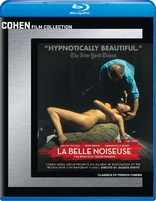La Belle Noiseuse Blu-ray Movie
HomeLa Belle Noiseuse Blu-ray Movie 
The Beautiful TroublemakerCohen Media Group | 1991 | 240 min | Not rated | May 08, 2018
Movie rating
7.8 | / 10 |
Blu-ray rating
| Users | 0.0 | |
| Reviewer | 4.5 | |
| Overall | 4.5 |
Overview
La Belle Noiseuse (1991)
Frenhofer, a once-famous artist hasn't painted in ten years. His last work, possibly his masterpiece, La Belle Noiseuse (the beautiful annoyance) remains unfinished. When another artist and his girlfriend Marianne visit, the beautiful and fiercely intelligent young woman inspires Frenhofer, and she reluctantly agrees to be his new model.
Starring: Michel Piccoli, Jane Birkin, Emmanuelle Béart, Marianne Denicourt, David BurszteinDirector: Jacques Rivette
| Foreign | Uncertain |
| Drama | Uncertain |
| Erotic | Uncertain |
Specifications
Video
Video codec: MPEG-4 AVC
Video resolution: 1080p
Aspect ratio: 1.37:1
Original aspect ratio: 1.37:1
Audio
French: LPCM 2.0 (48kHz, 24-bit)
Subtitles
English
Discs
Blu-ray Disc
Two-disc set (2 BDs)
Playback
Region free
Review
Rating summary
| Movie | 4.5 | |
| Video | 5.0 | |
| Audio | 4.0 | |
| Extras | 2.5 | |
| Overall | 4.5 |
La Belle Noiseuse Blu-ray Movie Review
Time keeps on slippin', slippin', slippin'. . .
Reviewed by Jeffrey Kauffman May 4, 2018While La Belle Noiseuse is on its surface the story of a painter reconnecting with his creative spark after meeting a kind of “new, improved” Muse of sorts, it’s the opening heraldic if stringent array of brass on the soundtrack which instantly sets a fascinating if slightly discordant mood for the film. The perhaps anachronistic score is culled from Igor Stravinsky’s remarkable piece called Agon, a ballet which was choreographed by George Balanchine, but which has maintained a concert life of its own shorn of the dance element, and which offers some intriguing subtext for the film (more about that later). If you’re a fan of etymology, you may already know two words where Agon, which means struggle or contest, shows up — protagonist and antagonist, but kind of interestingly the struggle co-writer and director Jacques Rivette depicts in this long and languorous exploration of creativity doesn’t really involve a villainous type throwing up obstacles for a hero, instead focusing on a more internal struggle as an elderly artist tries to reignite his passion for both life in general and painting in particular. But Stravinsky’s angular, piercing music would seem to be a rather odd counterpoint to what some viewers unused to Rivette’s shall we say unhurried approach to unspooling his story may feel as they wend their way through a film that takes around four hours to unfold. As Richard Suchenski mentions in a commentary included on this two disc set as a supplement, Rivette intentionally loved drawing things out cinematically, convinced that the sheer act (if it can be called an act) of sitting in a theater and watching a film for extended periods of time created its own psychological “reality”, and there’s no disputing the fact that for those willing to surrender to the slow, insistent rhythms of La Belle Noiseuse, the film creates an almost hypnotic allure, even if not that much actually “happens” over the course of its rather long running time. La Belle Noiseuse won the Grand Prix at 1991’s Cannes Festival, and it remains one of the more highly regarded films from Rivette’s career, but it is one of those viewing experiences that may not appeal to everyone, even those accustomed to some of the eccentricities of this particular director or even Art House fare in general.
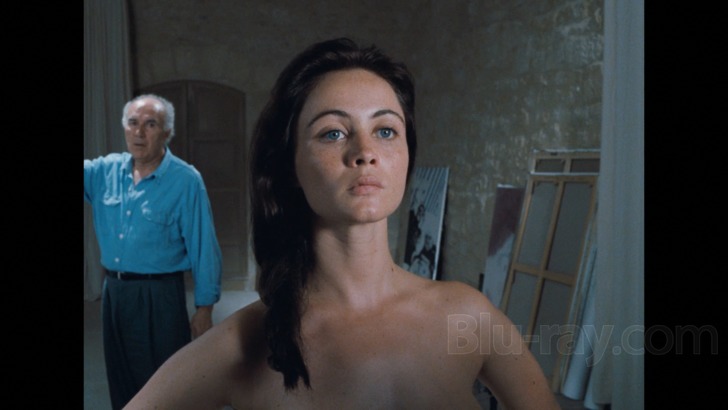
Suchenski’s commentary also brings up the fact that when Rivette edited Cahiers du Cinema he evidently included a couple of quotes from Stravinsky as epigraphs, something that inherently helps to provide evidence of the kinship the director felt with the iconoclastic composer. (Unfortunately, Suchenski doesn’t mention what the epigraphs said, and I haven’t been able to track down anything online.) While Suchenski mentions Stravinsky commenting about Balanchine’s “architectural” approach toward fashioning the choreography for Agon, and how that might be analogous to how Rivette structures La Belle Noiseuse, I’d maybe also point to another kind of “structure” that Rivette may have consciously or subconsciously gleaned from Stravinsky’s ballet score, and I’d maybe also call that the structure of vocabulary. Agon was one of the first, if not the first, times that Stravinsky went full on “twelve tone”, utilizing serial composition techniques in an attempt to forge a new musical vocabulary. This might be seen (heard?) as downright comical in a way, considering how completely new Stravinsky’s musical vocabulary had been even within the supposed context of non-twelve tone compositional styles, but it may be just as analogous in it own way to how Rivette attempts to turn away from traditional “narrative arcs” (to utilize a way overused phrase), playing instead with time and a perception of stasis that seems positively antithetical to the way many, maybe even most, directors approach structuring their films.
To give an actual cinematic example of some of what I’m trying to get at, a sudden connection to another French film with Jane Birkin and a character named Marianne sprung into my mind as I watched La Belle Noiseuse this time, though I don’t think I’d ever thought of this tether previously (I'm probably late to this realization, but there you have it). La Belle Noiseuse posits a French painter named Édouard Frenhofer (Michel Piccoli), whose previous muse was his wife of many years, Liz (Jane Birkin). While there’s still a respectful intimacy between the two, any inspiration she may have lent to her husband seems to have dried up, a situation that changes quickly once Marianne (Emmanuelle Béart), whose own boyfriend Nicolas (David Burzstein) is an aspiring artist, comes to visit. (Certain plot points of the film have been culled from a short story by Balzac called The Unknown Masterpiece.)
For those of you who have seen 1969’s La piscine or its 2015 kinda sorta remake A Bigger Splash, you may want to contrast and compare how those films dealt with a long relationship suddenly being challenged by the arrival of a young woman. Can it be pure coincidence that a director with Rivette’s obvious knowledge of French cinema offers a story with the same basic setup, with Birkin, who played the “young thing” in La Piscine, now the spouse, or that the first film’s spouse was named Marianne while now it’s the younger woman’s name in La Belle Noiseuse? One way or the other, an entry like La Piscine or its reboot tend to indulge in certain florid theatrics, while La Belle Noiseuse plays everything decidedly low key most of the time, even when Liz's emotions are being discussed.
If certain swaths of La Belle Noiseuse might cheekily be described as being “as exciting as watching paint dry”, since that’s more or less exactly what you spend a fair amount of time seeing in this film, that’s obviously part and parcel of Rivette’s whole strategy with this film. It’s perhaps a given that La Belle Noiseuse makes the probably obvious point that Art takes time, but Rivette may also be suggesting that time itself is an integral part of the Art being created.
La Belle Noiseuse Blu-ray Movie, Video Quality 
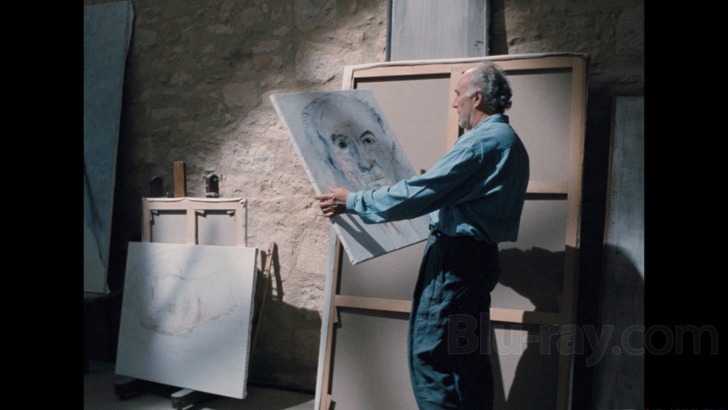
La Belle Noiseuse is presented on Blu-ray courtesy of Cohen Film Collection with an AVC encoded 1080p transfer in 1.37:1. Touted as having been sourced from a new 4K restoration, this is another stellar presentation of a cult item from Cohen, one with an appealingly organic appearance throughout, and nicely delicate levels of fine detail in the many close-ups employed. The palette is nicely suffused, and the film's prevalence of blue tones is rendered quite beautifully. Grain can look just slightly thick in some of the darker moments (quite a bit of the film takes place in the somewhat dimly lit studio of Frenhofer), but never really encounters any resolution issues.
La Belle Noiseuse Blu-ray Movie, Audio Quality 
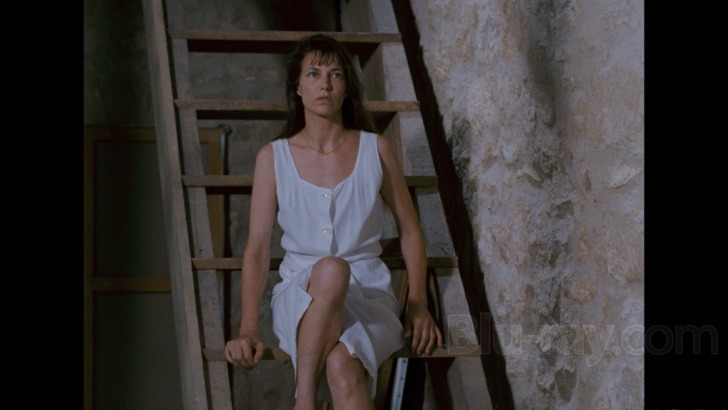
La Belle Noiseuse features an LPCM 2.0 mono track in the original French with forced English subtitles (more about that in a moment). The track has no problems supporting the bursts of Stravinsky's music, and similarly renders the dialogue without any problems. Fidelity is fine throughout, and there are no issues with distortion or dropouts. My one issue is that the subtitles are in white and Rivette frames several scenes with lighter tones predominating in the bottom of the frame, making reading a bit of a challenge at times.
La Belle Noiseuse Blu-ray Movie, Special Features and Extras 
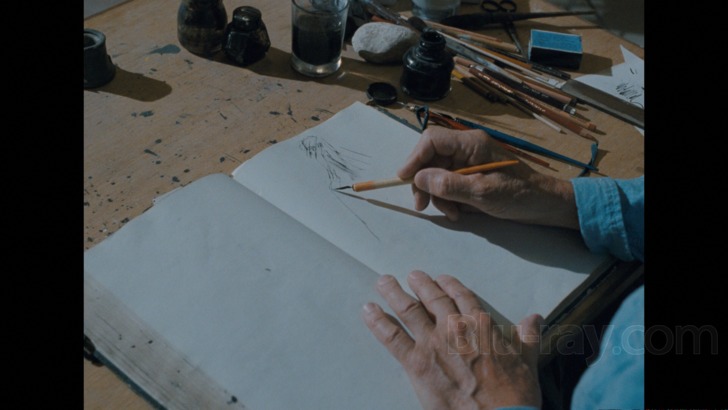
Disc One
- Feature Length Audio Commentary Track by Film Historian Richard Suchenski
- Feature Length Audio Commentary Track by Film Historian Richard Suchenski
- Interview with Director Jacques Rivette (480i; 13:28) is an interesting archival piece which looks like it might have been shot in a restaurant with Rivette sitting in a booth. He starts out by saying that he made the film as a joke, and then moves on from there. In French with forced English subtitles.
- Interview with Co-Writers Pascal Bonitzer and Christine Laurent (480i; 21:10) is another archival piece, this time looking like it might have been taped at a radio interview session, with the two discussing their collaboration with Rivette on a number of films. In French with forced English subtitles.
- 2017 Re Release Trailer (1080p; 1:51)
La Belle Noiseuse Blu-ray Movie, Overall Score and Recommendation 
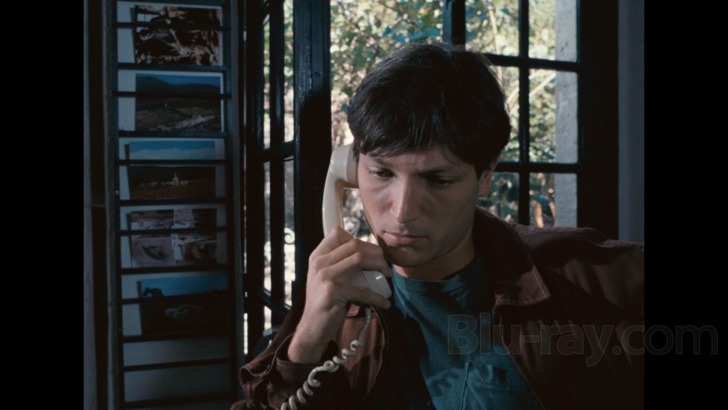
For those who can get beyond a traditional "and then what happened" mentality when watching a film, La Belle Noiseuse can be a rewarding, if long gestating, experience. There's a rather interesting subtext of hints of madness at times ("noiseuse" is defined as meaning "nutty" at one point in the film), but emotions are played pretty close to the vest throughout, leaving a lot to be read between the veritable lines. La Belle Noiseuse is probably not a film for everyone, even for those who may like Rivette, but for me personally it has long struck me as a rather potent meditation on creativity and inspiration within the context of passing time. Cohen has provided a release with nice technical merits and some appealing supplements. Highly recommended.
Similar titles
Similar titles you might also like

The Flower of Evil
La fleur du mal | 4K Restoration
2003

Le Petit Soldat
The Little Soldier
1963

Children of Paradise
Les enfants du paradis
1945

The Past
Le Passé
2013

Himalaya
1999

Timbuktu
2014

Dheepan
2015

Lacombe, Lucien
1974

Of Gods and Men
Des hommes et des dieux
2010

Out 1
Out 1, noli me tangere
1971

Like Someone in Love
ライク・サムワン・イン・ラブ / Raiku samuwan in rabu
2012

Story of Sin
Dzieje grzechu
1975

Au hasard Balthazar
1966

Tout Va Bien
1972

Return to Seoul
Retour à Séoul
2022

Touki Bouki
1973

Le beau Serge
1958

Stray Dogs
郊游 / Jiao you
2013

Drive My Car
ドライブ・マイ・カー / Doraibu mai kâ
2021

Muriel, or the Time of Return
Muriel ou le temps d'un retour
1963
